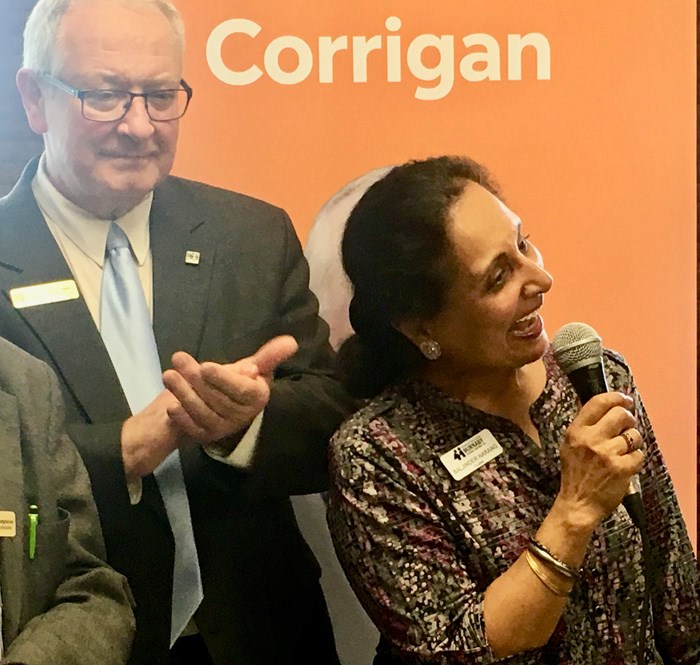Burnaby Mayor Derek Corrigan said he was debating whether to run again in 2018, but one issue was the deciding factor - the proposed Trans Mountain pipeline expansion.
Corrigan said city staff studied the problem for a year and came back to say they couldn’t find any benefits from the project to the city.
“This has been a battle that was put upon us – we didn’t go looking for trouble – we ended up having it imposed on us,” Corrigan told a crowded room at the Burnaby Citizens’ Association headquarters on Saturday afternoon, the first official day of the municipal election.
It was the official launch of the campaign of the municipal party that has had a stranglehold on Burnaby politics for many years.
In addition to Corrigan, all seven current BCA councillors are running for re-election (one seat is vacant after the BCA’s Anne Kang ran and won as a BC NDP MLA).
When asked by the NOW about the BCA platform, Corrigan referred to their record in the municipality over the past three decades.
“I think you have to look at the accomplishments we’ve had over the course of the last 30 years in order to gauge what we’ll do in the future,” Corrigan said. “I think our record’s been outstanding in building Burnaby, and doing things that have made Burnaby one of the most progressive cities in the country.”
This included, he said, financial stability, large green spaces and economic development.
“Those are very positive criteria for a city.”
And he defended his municipal government’s record in tackling the housing issue with the tools they had, citing the pressure of growth coming from people moving to the Lower Mainland.
“The whole region is trying to accommodate what for an extended period of time has been exponential growth,” he said. It’s a “tough problem” for everyone to manage growth without increasing single-occupancy cars and impinging on green spaces.
Corrigan was not endorsed this time by the New Westminster and District Labour Council even though other BCA council and trustee candidates were.
His opponent, Mike Hurley, was the mayoral candidate endorsed by the labour organization.
Corrigan said he thinks it was because the labour council was critical of the city’s handling of housing issues, but that’s a criticism being levelled at every municipality.
“There is no easy solution – you can take the position Vision (Vancouver) did and keep throwing money at the problem … it didn’t work for them,” he said.
Corrigan said any municipal politician running again will be criticized about the housing crisis.
But Corrigan also said he was asked to be interviewed by the labour council and he didn’t want that to happen.
“I thought that it would be a very difficult process to go in and be interviewed by the labour council and give the wrong impression to the public that somehow I was obligated for any endorsement made – I don’t make promises that obligate me,” Corrigan said.
When asked about a perception of being “heartless” policies in the face of demovictions, Corrigan said he said that’s a criticism of a small group of people, adding the city has demanded that developers help people find new accommodation and exceed many of the requirements of the residential tenancy act.
“I think that what we’ve done is we’ve enabled a program that will give people a lengthy notice to leave, will compensate them financially for leaving – but we’ve never had any control over whether or not buildings are demolished,” Corrigan said. “An owner of a building has a right when that building has reached its usable life to demolish the building and rebuild under the existing zoning.”
If the new zoning didn’t exists, Corrigan said nothing would have stopped the building owners from tearing them down and rebuilding three or four storey buildings.
High-density development has let the city put aside money and into a housing fund. Corrigan said there is $100 million already being rolled out to build affordable housing in partnership with non-profits.
“We’ve been looking for land and opportunities to utilize that money,” he said, “to accommodate people with modest means.” Another $100 million will be coming from future developments for similar projects, he added.
Corrigan said the focus should instead be on financial stability and keeping taxes low, because taxpayers don’t want to pay for someone else’s housing.
“The only way I can do anything is to get the money from developers,” Corrigan said.



